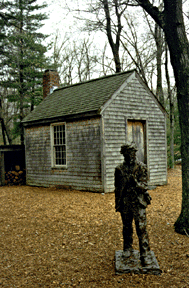 |
|
(Nathaniel Hawthorne, The American Notebooks,
Randall Stewart, ed., pp. 166-168. Copyright 1960 by the President and Fellows of Harvard College)


Thoreau began planning for his 10' by 15' house in March. The frame went up in May. And he was ready to move in on the 4th of July. The interior of the house was furnished with a bed, a table, a small desk and lamp, and three chairs -- "one for solitude, two for friendship, three for society."
While at Walden, Thoreau walked, studied, wrote, traveled and even hosted an anti-slavery fair.
In 1846, Thoreau stayed in jail overnight for refusing to pay his poll tax as a protest against his state's role in upholding slavery. In his 1849 essay Resistance to Civil Government, Thoreau states "I did not for a moment feel confined and the walls seemed a great waste of stone and mortar."
Of course, his stay in jail was among the shortest in Middlesex County's history. And like Bronson Alcott before him (who was jailed for the same reason), someone else paid his poll tax (Carlos Baker, Emerson Among The Eccentrics, New York: Viking Press, 1996, p.269).
 While at Walden, Thoreau strove to reduce his needs and to work efficiently. "The cost of a thing" says Thoreau, "is the amount of what I will call life which is required to be exchanged for it, immediately or in the long run."
While at Walden, Thoreau strove to reduce his needs and to work efficiently. "The cost of a thing" says Thoreau, "is the amount of what I will call life which is required to be exchanged for it, immediately or in the long run." In his essay Walden (found in The Cambridge Companion To Henry David Thoreau edited by Joel Myerson, Cambridge University Press, 1995, p. 99), Richard J. Schneider notes that Thoreau's cabin is the antithesis of the fancy homes admired by many New Englanders.
This did not keep Thoreau from visiting those self-same homes. And, sometimes, his own house "being so small, he had 'the difficulty of getting to a sufficient distance' from his guests whenever they 'began to utter the big thoughts in big words'" (Carlos Baker, Emerson Among The Eccentrics, New York: Viking Press, 1996, p.270).
Back to Home